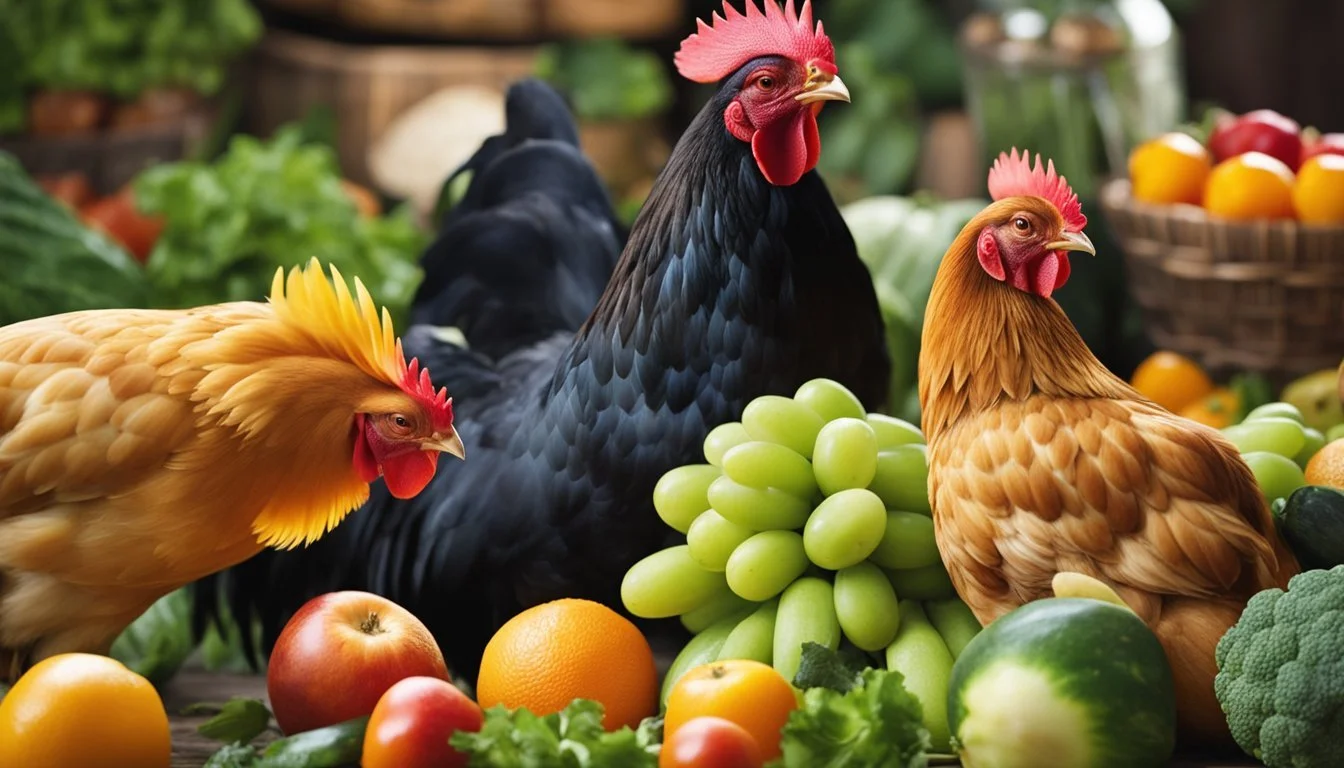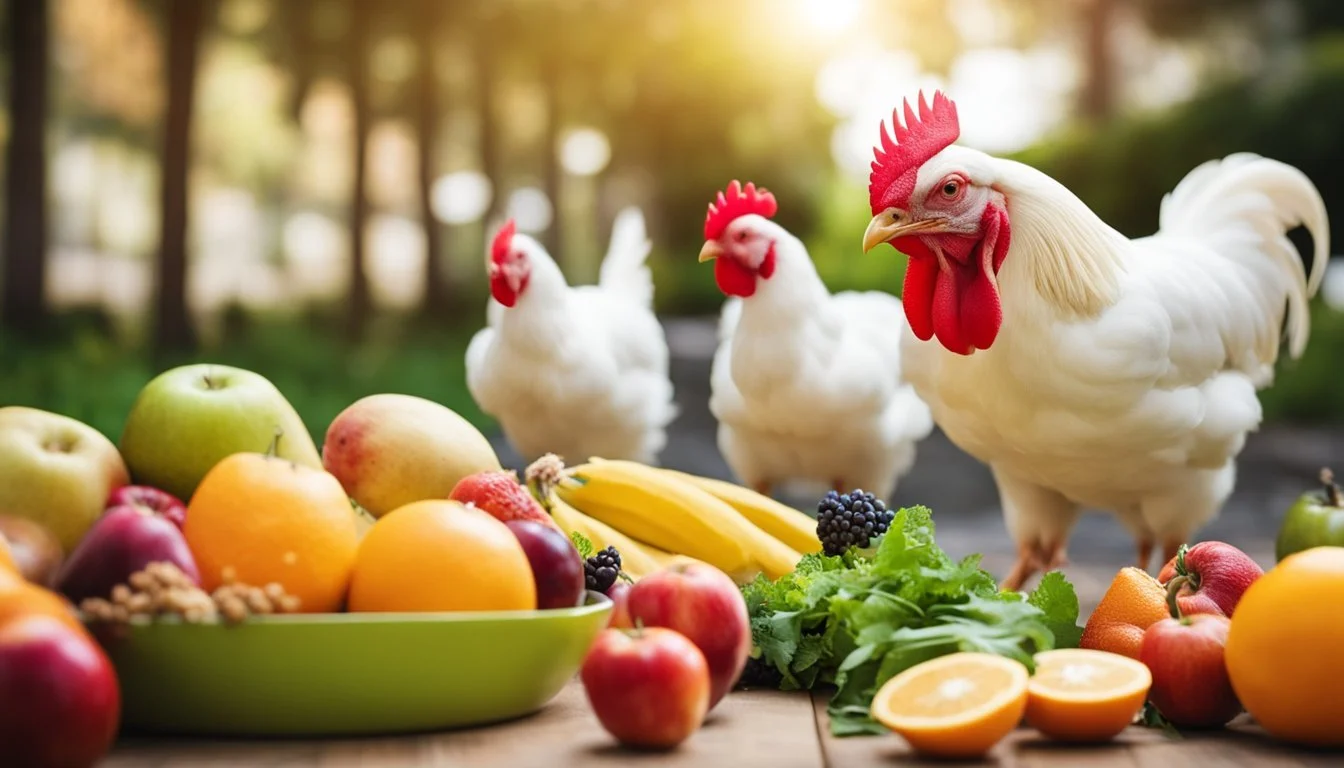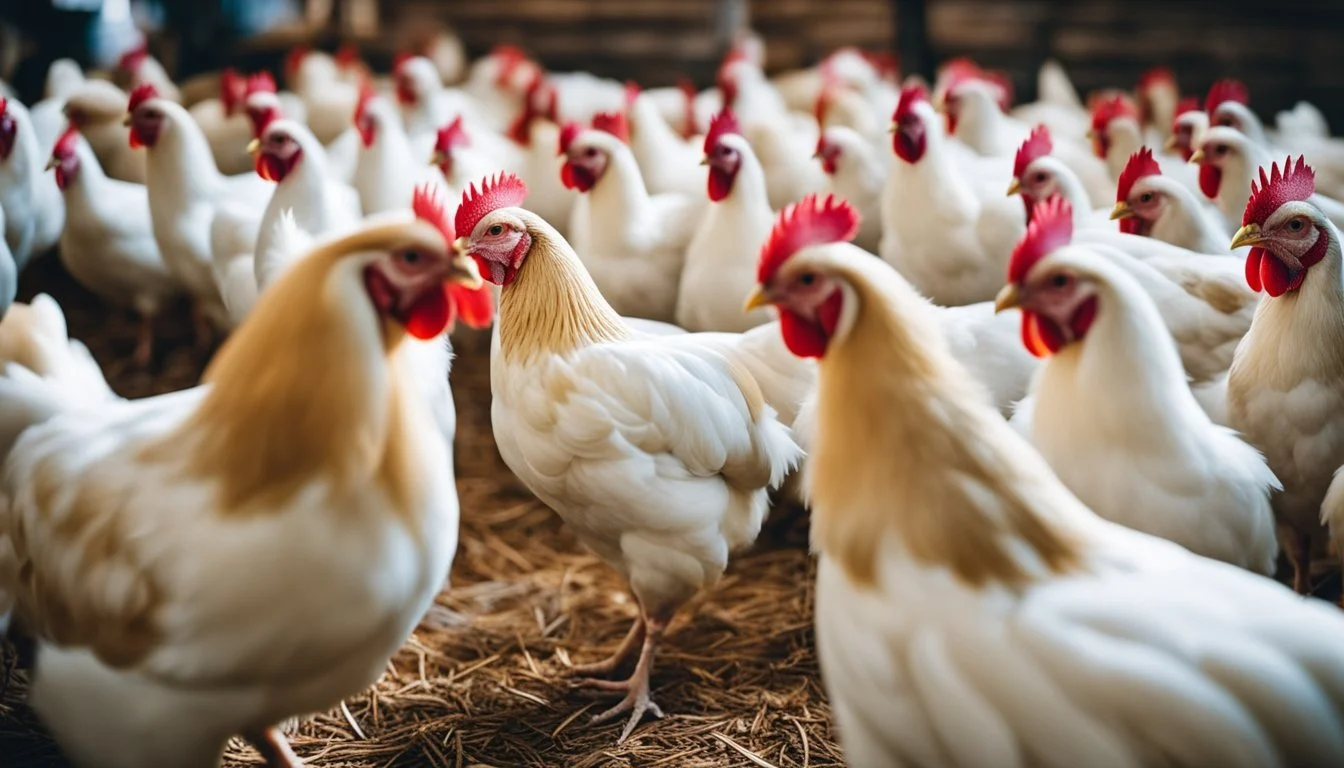8 Essential Vitamins and Minerals for Healthy Chickens
Boosting Nutrition and Health
Ensuring the health and vitality of chickens involves providing them with adequate nutrition, including essential vitamins and minerals. These nutrients play crucial roles in various physiological functions, from growth and immune support to the production of strong feathers and healthy eggs.
Supplying chickens with the right vitamins and minerals can significantly improve their overall well-being and productivity. In this article, readers will discover the eight essential nutrients that are vital for maintaining the health of their backyard flock.
1) Vitamin A
Vitamin A is crucial for chickens' overall health and well-being. It plays a significant role in maintaining healthy vision, particularly for chickens in low-light environments.
Vitamin A supports proper growth and bone formation, which is essential for young and developing birds. Additionally, it maintains the integrity of mucous membranes and skin.
This vitamin is also vital for reproductive health. Hens with adequate Vitamin A levels lay healthier eggs, and their offspring exhibit improved growth and vitality.
A deficiency in Vitamin A can lead to issues such as poor feather quality, decreased egg production, and weakened immunity. Sources of Vitamin A include green leafy vegetables and certain supplements formulated for poultry.
Ensuring that chickens receive enough Vitamin A is key to preventing infections and promoting robust health. This vitamin's comprehensive benefits demonstrate its importance in any poultry diet.
2) Vitamin D3
Vitamin D3 is crucial for the development and maintenance of strong bones in chickens. Chickens obtain this vitamin primarily through exposure to sunlight, where it is synthesized in the skin.
Deficiencies in Vitamin D3 can lead to beak and growth deformities in chicks. In adult laying hens, inadequate levels may cause fragile bones and poor egg quality.
In regions with limited sunlight, such as during long overcast periods, supplementation of Vitamin D3 becomes essential. Natural sources like kelp can be beneficial, but commercial supplements are also effective.
Optimal daily intake of Vitamin D3 varies, typically between 3,000 to 5,000 IU/kg, depending on factors like breed and age. Ensuring enough Vitamin D3 can prevent diseases and support overall poultry health.
3) Vitamin E
Vitamin E is a crucial fat-soluble antioxidant for chickens. It consists of eight isoforms: α-, β-, γ-, and δ-tocopherol and α-, β-, γ-, and δ-tocotrienol. This vitamin plays a significant role in maintaining the integrity and function of reproductive, muscular, circulatory, nervous, and immune systems.
Chickens rely on vitamin E for optimal growth and breeding. It helps protect cell membranes from oxidative damage, enhancing overall health. Additionally, vitamin E is stored in body tissues, ensuring availability when needed.
A deficiency in vitamin E can lead to serious health issues in chickens. Symptoms of deficiency include muscle weakness, poor growth, and immune system problems. Regular supplementation or access to natural sources like wheat germ, sunflower seeds, and leafy greens can help maintain adequate levels of this essential nutrient.
4) Calcium
Calcium is essential for chickens, particularly for egg-laying hens. It plays a critical role in forming strong eggshells and maintaining bone health. Without adequate calcium, hens may produce soft-shelled or malformed eggs.
Crushed oyster shells are a popular and effective way to supplement calcium. Other sources include limestone and commercial calcium supplements. These should be readily available for hens to consume at their own discretion.
Calcium needs to be balanced with phosphorus to support overall health. An imbalance can lead to issues such as weak bones or poor eggshell quality. Offering a well-rounded diet with the correct calcium-phosphorus ratio is crucial.
Calcium deficiency signs include thin-shelled eggs, reduced egg production, and skeletal problems. Providing high-quality supplements can prevent these issues and ensure chickens remain healthy and productive.
5) Phosphorus
Phosphorus plays a crucial role in the health and well-being of chickens. It is essential for the proper formation of bones and eggshells. This mineral supports energy metabolism by participating in the conversion of nutrients into usable energy.
It also helps maintain the acid-base balance in the blood. Phosphorus is involved in the synthesis of nucleic acids and cell membranes.
A deficiency in phosphorus can lead to weakened bones, poor growth, and reduced egg production. It can also cause rickets in young chicks. Ensuring an adequate supply of phosphorus in a chicken's diet is crucial for their development and productivity.
Dietary sources of phosphorus include grains, seeds, and supplements. Balanced diets often contain a mix of these sources to meet the chickens' nutritional needs.
6) Iron
Iron plays a crucial role in the health of chickens, particularly in the formation of hemoglobin in red blood cells. Hemoglobin is essential for transporting oxygen throughout the body, which supports overall vitality and energy levels.
Iron deficiency in chickens can lead to anemia, evident by signs such as lethargy and pale combs or wattles. Ensuring the chickens receive adequate iron helps maintain their immune system.
Dietary sources of iron for chickens include leafy greens, meat scraps, and certain grains. Supplements can also be provided to ensure they receive the necessary amount.
Proper iron levels are vital for hens, especially those laying eggs, as it aids in the healthy development of embryos. Balanced iron intake supports better growth and productivity in flocks.
7) Zinc
Zinc is a crucial trace mineral for chickens. It plays a significant role in the formation of insulin and various enzymes.
Even mild deficiencies can affect growth and development. Zinc is responsible for catalytic, structural, and regulatory functions in the body.
For immune function, zinc is essential. It helps support the overall health and efficiency of chickens' immune systems. Proper zinc levels contribute to better disease resistance.
Zinc also influences feather quality. Adequate intake ensures healthy, strong, and vibrant feathers.
Chickens get zinc from their diet. It’s typically found in commercial feed formulations. However, if you notice any deficiencies, supplements can be added to their feed.
Maintaining optimal zinc levels is vital for the well-being of your flock.
8) Selenium
Selenium is a trace element essential for the health and productivity of chickens. It is critical for reproductive health, contributing to semen quality, hatchability, and egg production. Selenium's role in maternal programming ensures robust offspring development.
A daily dietary intake of 0.06 ppm is recommended for laying hens to maintain egg production. Broiler breeders require a slightly higher intake, about 0.2-0.3 ppm daily.
Selenium is important for preventing deficiencies that can lead to serious health issues. A deficiency in selenium may result in weak muscles, poor growth, and reproductive problems.
Typical sources of selenium include feed additives and natural sources such as grains and seeds. Having a balanced selenium intake helps bolster the chicken's immune system and overall vitality.
Supplementing chicken feed with selenium-enriched products can be effective. Care must be taken, however, to ensure that the dosage is accurately measured to avoid over-supplementation, which can be toxic.
Importance of Vitamins and Minerals for Chickens
Vitamins and minerals are crucial for maintaining the health and well-being of chickens. They play essential roles in the growth and development of the birds, enhance egg production, and boost immunity.
Role in Growth and Development
Vitamins such as A, B, D, and E are vital for the growth and development of chickens.
Vitamin A ensures healthy vision and supports skin and feather health.
Vitamin D facilitates the absorption of calcium, which is critical for bone strength.
B vitamins, including B2, B6, and B12, play multiple roles. They assist in the metabolism of proteins, fats, and carbohydrates. This metabolic support is crucial for overall energy and growth.
Vitamin E helps in the development of muscles and nerves.
The combination of these vitamins ensures that chickens grow properly, develop strong bones, and maintain overall health.
Impact on Egg Production
Minerals such as calcium and phosphorus, alongside vitamins like A and D, significantly impact egg production.
Vitamin D is particularly important as it helps hens absorb calcium from their diet, which is essential for the formation of strong eggshells.
Vitamin A boosts reproductive health, leading to better egg production rates.
Calcium, paired with adequate Vitamin D, ensures the structural integrity of the eggshells, preventing issues like soft-shelled or deformed eggs.
Phosphorus works alongside calcium to ensure that the eggshells are robust and the eggs are healthy.
Having a balanced intake of these vitamins and minerals leads to higher egg productivity and better quality eggs.
Enhancing Immunity
Chickens require a robust immune system to fend off diseases, and vitamins play a significant role here.
Vitamin C and Vitamin E are potent antioxidants that protect against cellular damage.
B vitamins, especially B6 and B12, support immune function by assisting with the production of antibodies and white blood cells.
Minerals like zinc and selenium also contribute to immune health. They play a role in the development of the immune cells and the maintenance of a healthy immune response.
Together, these vitamins and minerals ensure that chickens remain healthy, less susceptible to infections, and capable of maintaining high levels of productivity.
Ensuring a Balanced Diet
Providing chickens with a balanced diet ensures they receive the essential vitamins and minerals they need for optimal health. The diet should include natural sources of nutrients and be supplemented with commercial feed as necessary.
Natural Sources of Nutrients
Natural sources of nutrients are vital for maintaining the health of chickens. Fresh greens such as kale, spinach, and dandelion greens offer a rich supply of vitamins A, C, and K. These vegetables also provide essential minerals like calcium and iron.
Fruits and vegetables like carrots, pumpkins, and berries can be added to their diet to supply vitamins A and E, which support vision and immune function. Additionally, mealworms and insects are excellent natural sources of protein and several B vitamins, essential for energy and metabolism.
Grains such as oats, barley, and corn contribute a significant amount of carbohydrates and fiber. These ingredients support digestive health and provide sustained energy. By incorporating these natural foods, a more diverse and balanced diet is achieved.
Supplementing with Commercial Feed
Commercial feed is engineered to meet the nutritional needs of chickens at different life stages. It often includes a balanced mix of proteins, carbohydrates, fats, vitamins, and minerals. Layer feed, for instance, typically contains 16-18% protein to support egg production.
Most commercial feeds are fortified with essential vitamins and minerals, such as vitamin D3 for bone development and calcium for strong eggshells. Amino acids like methionine and lysine, important for growth and feather quality, are also included.
Using commercial feed ensures consistency in nutrient intake, reducing the risk of deficiencies. Pellets, mash, and crumbles are common forms, allowing for flexibility based on the chickens' preferences and needs.
By combining natural sources and supplementing with commercial feed, chickens receive a well-rounded diet essential for their health and productivity.
Signs of Deficiency in Chickens
Recognizing the signs of vitamin and mineral deficiencies in chickens is crucial for maintaining their health. These deficiencies can manifest in both physical symptoms and behavioral changes, impacting overall poultry productivity.
Physical Symptoms
Chickens with vitamin deficiencies often exhibit clear physical signs.
Riboflavin (B2) deficiency, for instance, can lead to curly toe paralysis where chicks rest on their hocks and cannot walk properly. They may also show reduced growth rates even with a good appetite.
A lack of Niacin (B3) can cause dermatitis, feather issues, and decreased growth speed.
Vitamin A deficiency results in weakness, dull feathers, and poor bone development. They might also suffer from vision problems.
Without adequate Vitamin D, chickens may have soft bones and weak eggshells due to poor calcium absorption.
Behavioral Changes
Nutritional deficiencies also affect chicken behavior. For example, chickens suffering from a B-vitamin deficiency often exhibit lethargy and reduced activity levels.
Chickens deficient in Vitamin K may experience clotting issues, making them more susceptible to injury.
Vitamin E deficiency might lead to muscle weakness and difficulty in movement, sometimes causing chickens to be less mobile and more prone to predators.
Observe any reduction in egg production and changes in feeding habits, as these can indicate a potential deficiency. Nutrient imbalances can make chickens more susceptible to infections and diseases, reflecting a compromised immune system.










